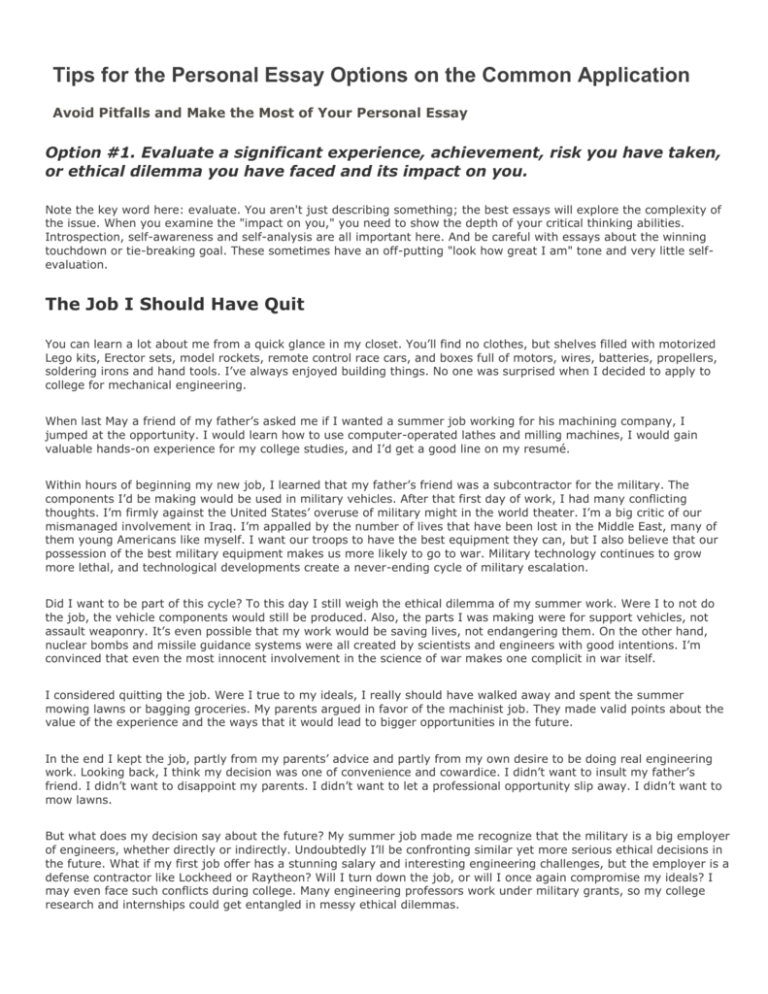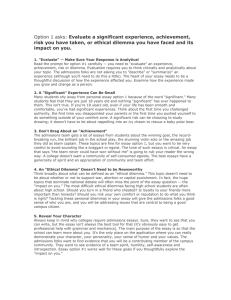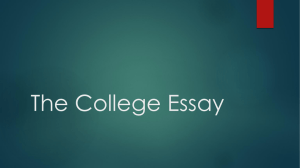1. "Evaluate" - College Admissions Strategies
advertisement

Tips for the Personal Essay Options on the Common Application Avoid Pitfalls and Make the Most of Your Personal Essay Option #1. Evaluate a significant experience, achievement, risk you have taken, or ethical dilemma you have faced and its impact on you. Note the key word here: evaluate. You aren't just describing something; the best essays will explore the complexity of the issue. When you examine the "impact on you," you need to show the depth of your critical thinking abilities. Introspection, self-awareness and self-analysis are all important here. And be careful with essays about the winning touchdown or tie-breaking goal. These sometimes have an off-putting "look how great I am" tone and very little selfevaluation. The Job I Should Have Quit You can learn a lot about me from a quick glance in my closet. You’ll find no clothes, but shelves filled with motorized Lego kits, Erector sets, model rockets, remote control race cars, and boxes full of motors, wires, batteries, propellers, soldering irons and hand tools. I’ve always enjoyed building things. No one was surprised when I decided to apply to college for mechanical engineering. When last May a friend of my father’s asked me if I wanted a summer job working for his machining company, I jumped at the opportunity. I would learn how to use computer-operated lathes and milling machines, I would gain valuable hands-on experience for my college studies, and I’d get a good line on my resumé. Within hours of beginning my new job, I learned that my father’s friend was a subcontractor for the military. The components I’d be making would be used in military vehicles. After that first day of work, I had many conflicting thoughts. I’m firmly against the United States’ overuse of military might in the world theater. I’m a big critic of our mismanaged involvement in Iraq. I’m appalled by the number of lives that have been lost in the Middle East, many of them young Americans like myself. I want our troops to have the best equipment they can, but I also believe that our possession of the best military equipment makes us more likely to go to war. Military technology continues to grow more lethal, and technological developments create a never-ending cycle of military escalation. Did I want to be part of this cycle? To this day I still weigh the ethical dilemma of my summer work. Were I to not do the job, the vehicle components would still be produced. Also, the parts I was making were for support vehicles, not assault weaponry. It’s even possible that my work would be saving lives, not endangering them. On the other hand, nuclear bombs and missile guidance systems were all created by scientists and engineers with good intentions. I’m convinced that even the most innocent involvement in the science of war makes one complicit in war itself. I considered quitting the job. Were I true to my ideals, I really should have walked away and spent the summer mowing lawns or bagging groceries. My parents argued in favor of the machinist job. They made valid points about the value of the experience and the ways that it would lead to bigger opportunities in the future. In the end I kept the job, partly from my parents’ advice and partly from my own desire to be doing real engineering work. Looking back, I think my decision was one of convenience and cowardice. I didn’t want to insult my father’s friend. I didn’t want to disappoint my parents. I didn’t want to let a professional opportunity slip away. I didn’t want to mow lawns. But what does my decision say about the future? My summer job made me recognize that the military is a big employer of engineers, whether directly or indirectly. Undoubtedly I’ll be confronting similar yet more serious ethical decisions in the future. What if my first job offer has a stunning salary and interesting engineering challenges, but the employer is a defense contractor like Lockheed or Raytheon? Will I turn down the job, or will I once again compromise my ideals? I may even face such conflicts during college. Many engineering professors work under military grants, so my college research and internships could get entangled in messy ethical dilemmas. I’m hoping I’ll make a better decision the next time my ideals are challenged. If nothing else, my summer job has made me more aware of the types of information I want to collect before I accept a job and arrive at my first day of work. What I learned about myself during my summer work wasn’t exactly flattering. Indeed, it makes me realize that I need college so that I can develop not just my engineering skills, but also my ethical reasoning and leadership skills. I like to think that in the future I’ll use my engineering skills to better the world and tackle noble causes like climate change and sustainability. My bad decision this past summer has inspired me to look ahead and find ways to make my ideals and my love of engineering work together. Critique – Like all college admissions essays, however, essays for Common Application option #1 must accomplish a specific task: they must be written clearly and tightly, and they must provide evidence that the writer has the intellectual curiosity, open-mindedness and the strength of character necessary to be a contributing and successful member of the campus community. The Title - Drew's title is rather straight-forward, but it is also quite effective. We immediately want to know why Drew should have quit this job. We also want to know why he didn't quit the job. Also, the title captures a key element of Drew's essay -- Drew is not writing about a great success he had, but a personal failure. His approach carries with it a little risk, but it is also a refreshing change from all the essays about how great the writer is. The Topic - Most applicants think they have to make themselves look super-human or infallible in their essays. The admissions folks read scores of essays on "significant events" in which the writer describes a winning touchdown, a brilliant moment of leadership, a perfectly executed solo, or the happiness brought to the less-fortunate by an act of charity. Drew does not go down this predictable road. At the heart of Drew's essay is a failure -- he acted in a way that did not live up to his personal ideals. He chose convenience and self-advancement over his values, and he emerges from his ethical dilemma thinking he did the wrong thing. One could argue that Drew's approach to the essay is foolish. Does a top college really want to admit a student who so easily compromises his values? But let's think of the issue differently. Does a college want to admit all those students whose essays present them as braggarts and egoists? Drew's essay has a pleasing level of self awareness and self criticism. We all make mistakes, and Drew owns up to his. He is disturbed by his decision, and his essay explores his inner conflicts. Drew is not perfect -- none of us are -- and he is refreshingly up front about this fact. Drew has room to grow and he knows it. Also, Drew's essay isn't just about his faulty decision. It also presents his strengths -- he is passionate about mechanical engineering and has been for most of his life. The essay succeeds in showing off his strengths at the very time it examines his weaknesses. Essay option #1 often leads to a bunch of predictable and conventional essays, but Drew's will stand out from the rest of the pile. The Tone - Drew is a fairly serious and introspective guy, so we don't find much humor in his essay. At the same time, the writing isn't too heavy. The opening description of Drew's closet and the repeated mention of mowing lawns add a little lightness to the writing. Most importantly, the essay manages to convey a level of humility that is refreshing. Drew comes across as a decent person, someone who we'd like to get to know better. The Writing - Drew's essay has been carefully edited and revised. It contains no glaring problems with grammar and style. The language is tight and the details are well chosen. The prose is tight with a good variety of sentence structure. Immediately Drew's essay tells the admissions folks that he is in control of his writing and ready for the challenges of college-level work. Drew's response gets the job done effectively without rambling on. The admissions folks are unlikely to lose interest. Final Thoughts - As you write your essay, you should think about the impression you leave your reader with. Drew's does an excellent job on this front. Here's a student who already has great mechanical ability and a love for engineering. He is humble and reflective. He is willing to take risks, and even risks critiquing the source of funding for some college professors. We leave the essay understanding Drew's values, his doubts and his passions. 5 Tips for a College Admissions Essay on a Significant Experience Option 1 asks: Evaluate a significant experience, achievement, risk you have taken, or ethical dilemma you have faced and its impact on you. 1. "Evaluate" -- Make Sure Your Response is Analytical Read the prompt for option #1 carefully -- you need to "evaluate" an experience, achievement, risk or dilemma. Evaluation requires you to think critically and analytically about your topic. The admissions folks are not asking you to "describe" or "summarize" an experience (although you'll need to do this a little). The heart of your essay needs to be a thoughtful discussion of how the experience affected you. Examine how the experience made you grow and change as a person. 2. A "Significant" Experience Can Be Small Many students shy away from personal essay option 1 because of the word "significant." Many students feel that they are just 18 years old and nothing "significant" has ever happened to them. This isn't true. If you're 18 years old, even if your life has been smooth and comfortable, you've had significant experiences. Think about the first time you challenged authority, the first time you disappointed your parents or the first time you pushed yourself to do something outside of your comfort zone. A significant risk can be choosing to study drawing; it doesn't have to be about rappelling into an icy chasm to rescue a baby polar bear. 3. Don't Brag About an "Achievement" The admissions team gets a lot of essays from students about the winning goal, the record-breaking run, the brilliant job in the school play, the stunning violin solo or the amazing job they did as team captain. These topics are fine for essay option 1, but you want to be very careful to avoid sounding like a braggart or egoist. The tone of such essays is critical. An essay that says "the team never could have won without me" is going to rub your reader the wrong way. A college doesn't want a community of self-consumed egoists. The best essays have a generosity of spirit and an appreciation of community and team effort. 4. An "Ethical Dilemma" Doesn't Need to be Newsworthy Think broadly about what can be defined as an "ethical dilemma." This topic doesn't need to be about whether or not to support war, abortion or capital punishment. In fact, the huge topics that dominate national debate will often miss the point of the essay question -- the "impact on you." The most difficult ethical dilemmas facing high school students are often about high school. Should you turn in a friend who cheated? Is loyalty to your friends more important than honesty? Should you risk your own comfort or reputation to do what you think is right? Tackling these personal dilemmas in your essay will give the admissions folks a good sense of who you are, and you will be addressing issues that are central to being a good campus citizen. 5. Reveal Your Character Always keep in mind why colleges require admissions essays. Sure, they want to see that you can write, but the essay isn't always the best tool for that (it's obviously easy to get professional help with grammar and mechanics). The main purpose of the essay is so that the school can learn more about you. It's the only place on the application where you can really demonstrate your character, your personality, your sense of humor and your values. The admissions folks want to find evidence that you will be a contributing member of the campus community. They want to see evidence of a team spirit, humility, self-awareness and introspection. Essay option #1 works well for these goals if you thoughtfully explore the "impact on you."









